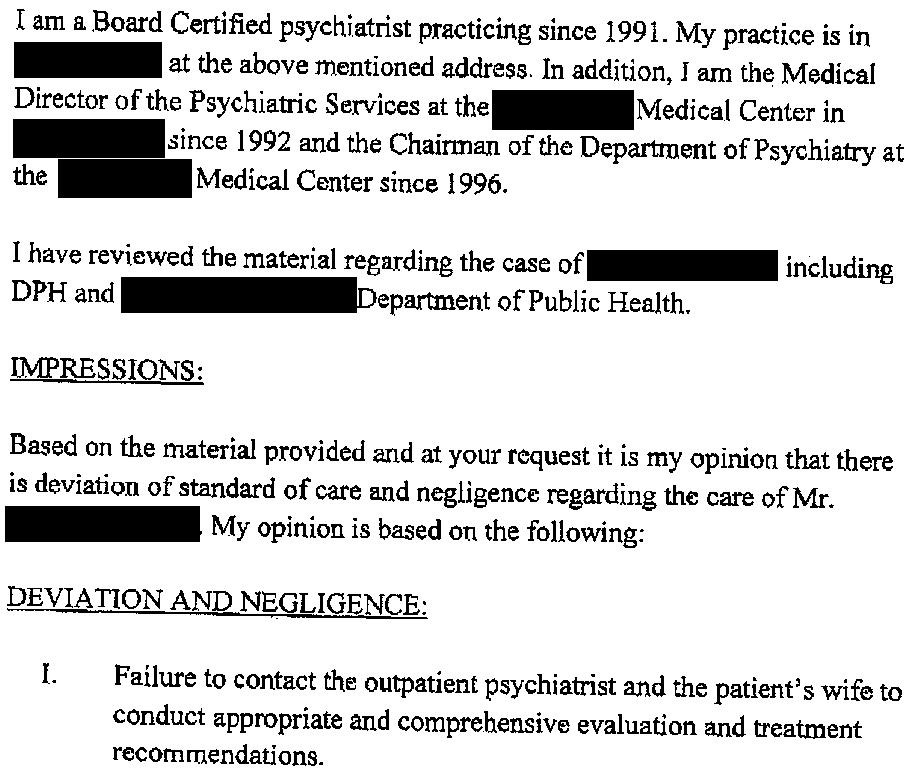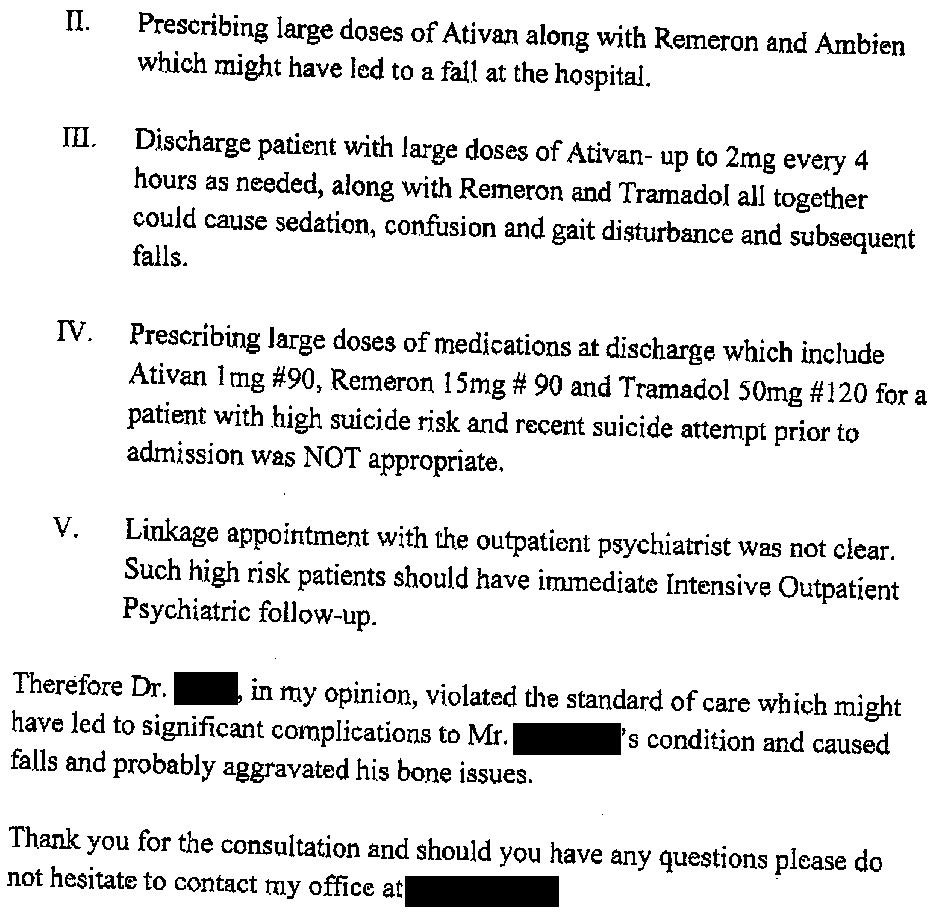A 62-year-old man presented to the ED with depression and suicidal ideation.
He had a history of benzodiazepine addiction.
His family reported that he was stealing his daughter’s benzodiazepines as well.
The patient had a longstanding relationship with a local psychiatrist, but the ED doctor felt that his condition was too acute for discharge.
He was transferred to a psychiatric inpatient hospital on May 10.
His inpatient course was uneventful, and he was ready for discharge on May 19.
The inpatient psychiatrist wrote prescriptions for multiple medications:
The patient filled all of these prescriptions and began taking them.
On May 23, the patient reportedly woke up in the middle of the night and was delirious.
He tried to walk to the bathroom, but fell and broke his right hip.
He was taken back to the ED, admitted, and had a long rehab stay after surgery.
Join 7200+ doctors and attorneys on the email list.
The patient and his family filed a lawsuit against the inpatient psychiatrist.
An expert witness was hired and wrote the following opinion for the plaintiff:
Feedback from subscribers:
"Thanks for all the work you do in putting these together. Always so interesting to look at cases and see how things unfold. The cases also make great teaching points for the residents on rounds."
“If you are thinking about doing expert witness work, I would highly recommend paying for Med Mal Reviewer's subscription service. That site has tons of examples of expert witness testimony and it cites the fees charged by physician expert witnesses of various specialties. Generally a more experienced expert witness can command a higher fee. There are usually multiple listed fees, for chart review, time spent in court / deposition, etc.”
The defense responded that the patient’s own negligence played a key role in his injury:
The attorneys went to 2 mediation sessions and ultimately reached a confidential settlement.
MedMalReviewer Analysis:
Prescribing large amounts of benzodiazepines to this patient was a questionable decision, especially in light of his prior abuse of these medications. However, it appears that the psychiatrist was not completely aware of this history.
The plaintiff’s attorney focused specifically on the Ativan prescription, but I suspect that the combination of multiple medications was likely a key issue. Tramadol is independently associated with falls as well, and mixing opioids with benzodiazepines is often a recipe for disaster.
The expert witness opinion has some accurate criticism but also has some key facts wrong. The fall happened at the patient’s house, not in the hospital. Furthermore, the patient did have follow-up arranged with his outpatient psychiatrist. An appointment was scheduled less than 7 days after his discharge.
One of my key theories about medical malpractice is that these lawsuits are often driven forward by an angry family member, as opposed to the patient themselves. The wife in this lawsuit was very upset with both the patient (due to his addiction) and the psychiatrist. She felt that there was not good communication and that the medication issues and resulting fall would not have happened if she had been more involved. Obtaining collateral information is especially important in psychiatry, and can go a long way in reducing medicolegal risk.
Previous Cases:
Synopsis: Patient treated for eye pain for months. Ultimately diagnosed with acanthamoeba keratitis and is left blind.
Delayed Appendicitis Diagnosis [Subscribers Only]
Synopsis: 16-year-old seen with abdominal pain and admitted by a pediatric surgeon for observation. 4 days later he developed peritonitis due to ruptured appendicitis.
Acute Chest Syndrome in Sickle Cell Patient [Subscribers Only]
Synopsis: Hematologist misdiagnosis respiratory problems in a sickle cell patient as opioid-related. Copy/pastes Up-To-Date articles as his consult note. Patient dies of acute chest syndrome.








It would be incredible if insurance would reimburse for the extended time necessary to do ideal psychiatric work including time gathering collateral from family. Unfortunately procedures carry the day for physician payment. Insurance is paying for the services provided, and I think a theoretical liability should exist. Reimburse poorly don’t be surprised doctors have to rush through patients to earn a living.
I find it surprising that a patient who had a longstanding relationship with an outpatient psychiatrist would present to the ER without the outpatient psychiatrist’s knowledge. At the very least, I would expect the family member to have notified the outpatient psychiatrist that their patient was in the hospital. If one of my patient’s becomes suicidal, they typically contact me first and if indicated I refer them to an ER and forward an admission note to the facility with a summary of the patient’s history and medications. It is absolutely appropriate for an inpatient psychiatrist to seek collateral from the patient’s outpatient psychiatrist and to coordinate the discharge with them as well as the family. All of my patients I refer to the ER or Inpatient take a signed release of information to allow both myself and their family/caretakers to receive information from the inpatient providers and not be cut off from all communications until the day before the hospital wants to discharge the patient, when the patient’s insurance runs out or they can no longer get maximum reimbursement. They also give the hospital upon admission a signed release so they automatically get a copy if their inpatient medical records upon discharge. There used to be a cpt code for a “meet and greet” that covered the outpatient psychiatrist visiting their patient in the hospital. And I was reimbursed for this for several cases some years ago. But this issue aside, the opioid/benzo combination problem was compounded by the amount of medication prescribed. I assume the inpatient psychiatrist was aware that the patient had a follow-up appointment with their outpatient psychiatrist in a week and thus should have only prescribed enough or slightly more to cover until that visit. It also seems the family had informed the inpatient psychiatrist that the patient was abusing benzodiazepines, and if so makes his discharging the patient with 90mg of lorazepam malpractice in my book. It’s important though to recognize that the lack of coordination between inpatient and outpatient providers and the use of HIPPA guidelines, which are inappropriately cited as justification to exclude critical family members from communication with the patient family member and their inpatient providers in the care and discharge planning from the point of admission does not benefit and ultimately compromises the patient’s care. Janice E. Cohen, MD San Francisco